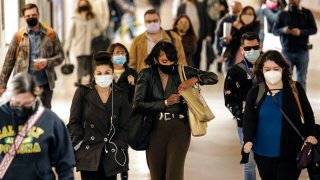
Gen Z and millennial workers are getting more and more stressed out and overwhelmed at work, a study shows.
According to Bain & Company, young people — especially those from advanced economies — are most worried about money issues and how their careers will pan out.
Generation Z workers are those between the ages of 18 and 25, while millennials fall between the ages of 26 and 41.
Get DFW local news, weather forecasts and entertainment stories to your inbox. Sign up for NBC DFW newsletters.
About 61% of respondents under the age of 35 were most concerned about finances, job security and failing to meet their career goals in the next 10 years, a survey by Bain found. Only 40% of those who were 35 and above shared the same concerns.
Some 20,000 workers were polled in the survey, and more than 100 people were interviewed. Respondents came from 10 countries: the United States, Germany, France, Italy, Japan, China, India, Brazil, Indonesia, and Nigeria. Together, they represent approximately 65% of global gross domestic product.
But not all young workers are feeling despondent about their future. In fact, those in emerging economies seem to be having a different experience.
Money Report
"According to our survey, 81% of workers in emerging markets said they felt optimistic that their lives would be better 5 to 10 years from now, compared with only 63% in developed economies," the report said.
Young employees today are grappling with "slowing economic growth, rising inequality, and declining housing affordability across the West," said Bain's report. Youth unemployment in Europe, for example, has reached "crushing levels" — 37% in Spain, 29% in Italy and 19% in France are unemployed, the report said. These factors have made financial stability more difficult to attain.
Increasing debt
Research from Bain & Company also showed that younger employees from advanced economies may be earning less than the generations before them.
"The odds of achieving absolute upward mobility — earning more than one's parents — are the lowest they have been in the US for any generation since World War II," the report said.
The earnings gap between young employees who enter high-skilled professions and those who do not is also widening. Yet about 40% of recent college graduates ended up in jobs that don't require them to have a higher education, the report said.
Many of those who could afford to attend college found themselves in a cycle of never-ending mounting debt.
"In places like the US, where higher education receives limited public funding, universities are also saddling workers with crippling debt," the report said.
"On top of everything else, younger workers will grapple with the burden of caring for an aging population. They also face the challenge of paying down public debt, which has ballooned as a result of the pandemic, at a time of slowing macroeconomic growth," the report said.
Pandemic fallout
Not all of the stressors younger workers face are unique to them, however. The pandemic has dealt a blow to nearly every economy in the world, with wide-ranging effects in the labor market at large.
The International Labour Organization (ILO), for example, expects global employment to return to pre-pandemic levels only in 2023.
The agency recently downgraded its 2022 labor market recovery forecast, and estimated global unemployment could reach 207 million this year. That's compared to 186 million in 2019 before the pandemic began.
Hours worked globally still remains 2% lower than pre-pandemic levels and employment in developing countries continues to be hit the hardest, it said.
"We're seeing the advanced economies pulling away from the low and middle income economies," said Sara Elder, senior economist at the ILO.
"The regions that are seeing the most difficult times in this recovery are indeed Southeast Asia, as well as in Latin America and the Caribbean," she said, referring to rising unemployment.
Gender inequality in the labor market has also worsened as more women are losing their jobs.
"We have seen the crisis impact women in the labor market to a greater degree than men, in part due to their need to look after the children who haven't been able to go to school," Elder told CNBC's "Squawk Box Asia" earlier in January.
Elder said more investments need to be made in the "care economy" — which includes services such as infant and child care — to make it easier for women to balance work and household duties.






